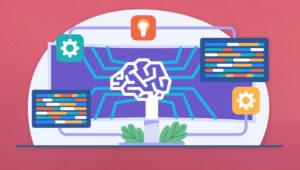The Ten Toughest Tasks in Development
The toughest tasks in development have little to do with writing software. Coding is an exercise in logical thought; it’s straight-forward compared to the other activities developers undertake on a daily basis. If you consider yourself a half-decent amateur programmer, ensure you can overcome these hurdles before leaping into the professional realm…
Key Takeaways
- The most challenging aspects of development often lie outside of the actual coding process, including tasks such as explaining the development process to non-coders, visualizing software solutions from brief and often unclear requirements, and estimating delivery times for tasks that have never been done before.
- Other demanding tasks involve working on someone else’s code, particularly when it lacks sufficient documentation, managing scope creep and unnecessary functionality requests, achieving a balance between under and over-optimization, and dealing with IT problems that can disrupt the development process.
- Interactions with people, including dealing with their misconceptions and often unrealistic expectations about software development, are also a significant part of the challenges faced by developers. This includes handling interruptions and requests for assistance with unrelated IT issues, as well as enduring the blame for failed functionality despite having predicted its failure.
1. Explaining what you do
Explaining the software development process is difficult. Non-coders may know a lot but, by definition, they cannot code. To them, we spend our lives hunched over a keyboard in a darkened room drinking coffee.
You will encounter the opinion from friends, family and colleagues that coding is “not a proper job”.
2. Visualizing software solutions
Given a set of brief — and often poorly-conceived — requirements, you’ll need to devise data repositories, code architecture, algorithms, communication protocols and any other technical facets which encompass a solution to the business problem. Then you need to explain it in layman’s terms and deliver within a specific time-frame.
Few developers can do it well.
3. Estimating delivery times
The bane of every developer’s life. It’s impossible to determine the time required to complete a task when that task has never been done before. Similar code may have been written, but it’s not in the same system with the same issues or restrictions.
Experience helps, but most coders under-estimate. That’s partly because they only consider the coding side and forget to the other activities on this list.
4. Working on someone else’s code
There are an infinite number of ways to create a software solution. Working on someone else’s code means spending many hours wading through thousands of lines of code to understand what they were thinking. Of course, this is made more difficult when the original developer didn’t believe in comments or documentation — then abandoned their half-finished project.
5. Scope creep and bizarre functionality
While agile development makes an allowance for scope creep, it doesn’t make it any less frustrating — especially when you’re asked for dumb functionality on a whim. You know it will fail. Your team knows it will fail. But the client knows better and, when failure inevitably occurs, it’s your fault because you didn’t believe in their vision.
6. Achieving a balance between under and over-optimization
Complex software is never be perfect; there’s always a better approach. It’s possible to optimize indefinitely and that’s why software projects are never delivered sooner than the due date.
On the flip side, there’s the “that’ll do — I’ll improve it later” mentality. The code will work today but you know it’ll cause anguish and failure tomorrow. Of course, you’ll never fix it; it’ll be left to the next poor developer.
7. Testing your code
You may write unit tests and pass software to teams of testers but bugs still materialize…
- Software is complex and may contain thousands of lines of code. There may be billions of possible interactions and pathway though the system; it’s impossible to test them all.
- Similarly, software interacts with different software on different systems under different conditions. You cannot test every eventuality.
- Writing good unit tests is tedious and hard work. Ideally, tests should be written before development commences — but try explaining to your client why four weeks of effort has resulted in no usable software.
- Unit tests won’t highlight every flaw. In a perfect world, a separate team would write the tests and actively compete to discover problems. Unfortunately, that’s too costly and time-consuming for most projects so the development team writes the tests. They will sub-consciously avoid any strange edge cases.
- Programmers have a logical approach to everything. Users rarely do; they will find issues you never expected.
8. Documenting your code
Documenting your code is laborious and time-consuming. Few developers are good at it and even fewer will take the time to read it.
9. Dealing with IT problems
You’re working with technology every day. You may be an HTML or PHP developer but you’ve probably had to overcome issues such as hard disk crashes, driver conflicts and software failures. It’s not your primary role but, unless you solved the problem, you wouldn’t be able to continue your development tasks.
Unfortunately, to everyone not involved in IT, you know everything. When they have a problem, they’ll contact you rather than spend any time trying to work it out for themselves. It doesn’t matter what the issue is: you use computers so you must know how to import payroll data into Sage, configure Oracle, or discover why outgoing email is failing on their Blackberry.
Of course, these interruptions won’t have an impact on the delivery schedule or be chargeable, will they?…
10. Dealing with people
The tasks above can be summarized as “dealing with people”. Few non-experts would advise a pilot how to fly a plane or suggest house re-wiring techniques to an electrician, but they’re happy making bold suggestions about software development.
I’m afraid there’s no way around it; you just need to accept that half the world has below-average intelligence!
Frequently Asked Questions (FAQs) about the Toughest Tasks in Development
What makes software development a challenging task?
Software development is a complex process that involves various stages such as planning, designing, coding, testing, and maintenance. Each stage has its own set of challenges. For instance, during the planning stage, developers need to understand the client’s requirements and expectations, which can be quite complex and ambiguous. During the coding stage, developers often encounter problems such as debugging, code optimization, and dealing with legacy code. Furthermore, keeping up with the rapidly evolving technology landscape and learning new programming languages and tools can also be quite challenging.
How can I overcome the challenge of understanding complex project requirements?
Understanding complex project requirements is indeed a tough task. However, it can be made easier by maintaining clear and open communication with the client. Ask questions to clarify any ambiguities and ensure you fully understand the project’s scope and objectives. Using visual aids such as diagrams and flowcharts can also help in understanding and explaining complex requirements.
What are some strategies to deal with debugging issues in software development?
Debugging can be a time-consuming and frustrating process. However, using a systematic approach can make it easier. Start by reproducing the error consistently. Then, isolate the part of the code causing the error. Use debugging tools to step through the code and monitor variables and system state. Finally, once the bug is fixed, test the solution thoroughly to ensure it doesn’t introduce new problems.
How can I manage the complexity of coding in software development?
Managing the complexity of coding can be achieved by following good coding practices. This includes writing clean and readable code, using comments to explain complex parts of the code, and following a consistent coding style. Additionally, using design patterns can help manage complexity by providing tested, proven solutions to common problems.
How can I keep up with the rapidly evolving technology landscape in software development?
Keeping up with the rapidly evolving technology landscape can be challenging. However, continuous learning and staying updated with the latest trends and technologies is crucial. This can be achieved by reading tech blogs, attending webinars and conferences, participating in online communities, and taking online courses.
What is the role of testing in software development?
Testing plays a crucial role in software development. It helps identify and fix bugs and errors in the code, ensuring the software functions as expected. It also helps improve the quality of the software and enhances user satisfaction.
How can I deal with the challenge of maintaining legacy code?
Dealing with legacy code can be challenging due to its complexity and lack of documentation. However, understanding the code’s functionality, refactoring the code, and writing tests can help manage this challenge.
What are some strategies to deal with code optimization issues?
Code optimization involves improving the code’s efficiency without affecting its functionality. This can be achieved by reducing the code’s complexity, eliminating unnecessary operations, and using efficient algorithms and data structures.
How can I improve my skills in software development?
Improving your skills in software development involves continuous learning and practice. This includes learning new programming languages and tools, working on different projects, and learning from experienced developers.
What are some common challenges faced by software developers?
Some common challenges faced by software developers include understanding complex project requirements, debugging, dealing with legacy code, managing code complexity, keeping up with rapidly evolving technologies, and testing.
Craig is a freelance UK web consultant who built his first page for IE2.0 in 1995. Since that time he's been advocating standards, accessibility, and best-practice HTML5 techniques. He's created enterprise specifications, websites and online applications for companies and organisations including the UK Parliament, the European Parliament, the Department of Energy & Climate Change, Microsoft, and more. He's written more than 1,000 articles for SitePoint and you can find him @craigbuckler.




